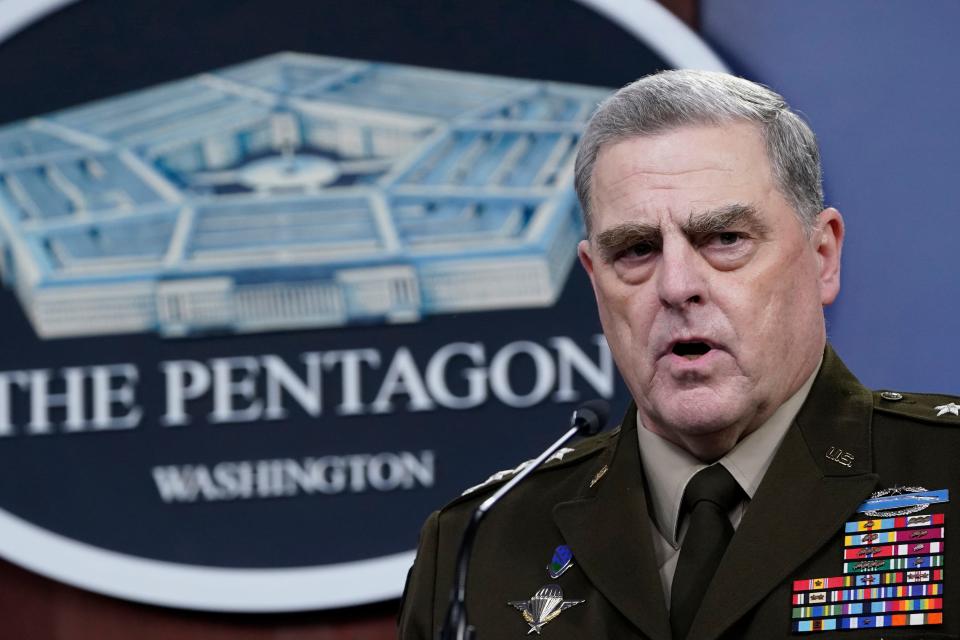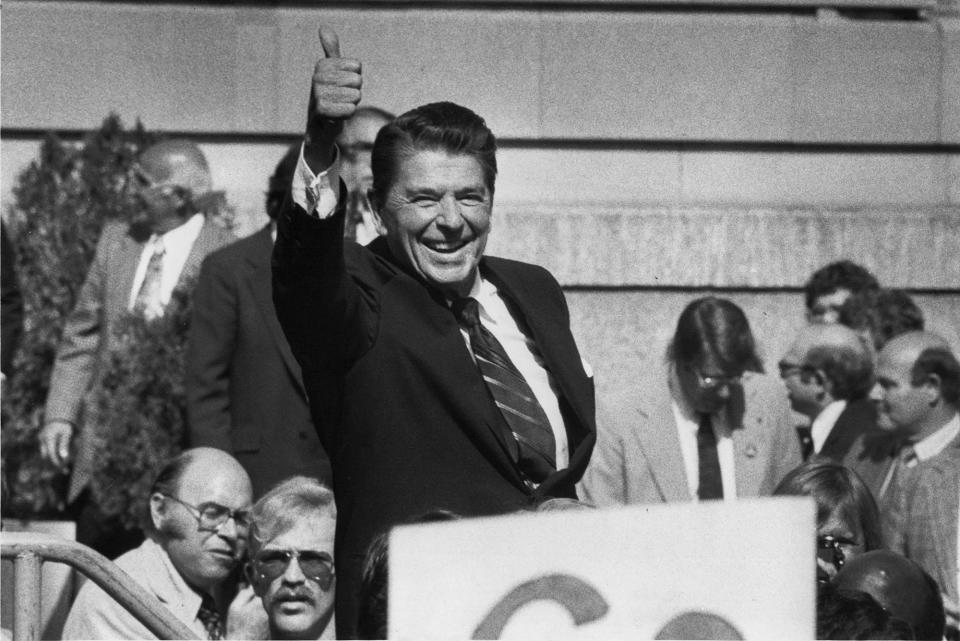Republican debate at Reagan library contrasts how 'Gipper,' Trump have spoken to Americans
- Oops!Something went wrong.Please try again later.
- Oops!Something went wrong.Please try again later.
Polls-leading Donald Trump will not be at Wednesday's Republican presidential debate, but his incendiary rhetoric in recent days may well take center stage.
The former president's posts on his social media platform have been especially heated; critics have said unhinged. Trump has taken aim at the nation's top military leader as well as the federal prosecutor who has brought two sets of indictments against him, plus a national broadcast news organization.
The statements have raised the specter Trump would pursue treason investigations against his social media targets, and maybe even an execution, should Trump win the presidency again in November of next year.
Trump's rhetoric is a sharp contrast to the late Ronald Reagan, the nation's 40th president and a leader long revered by Republicans and many non-GOP citizens alike. The comparison is appropriate given that Wednesday's debate on Sept. 27, will be at the Ronald Reagan Presidential Library & Museum in Simi Valley, California.
Here are five things to know:
1. What has Trump said that critics argue sounds unhinged?
Three sets of posts on Truth Social in particular sound pretty dark and menacing. Trump accused Pennsylvania's governor over that state's automatic voter registration system. He said it was more evidence that the nation "is being destroyed by these Lunatics, Marxists & Fascists."
Trump then went after Joint Chiefs of Staff Mark Milley, blaming him for the Afghanistan withdrawal, calling him a "Woke train wreck" and accusing him of tipping off China. "This act is so egregious that, in times gone by, the punishment would have been DEATH!" Trump wrote.

And for good measure, he repeated his attack on special counsel Jack Smith, who has brought two of the four sets of indictments against him, again calling him "deranged."
Trump also took aim at the NBC news network, and its MSNBC affiliate, saying they should be "investigated for its 'Country Threatening Treason.' " Trump vowed "openly and proudly" that if he wins, the presidency media will be "thoroughly scrutinized" and will "pay a big price."
First Republican debate: Trump wasn't on the stage, but his name came up just the same
2. Trump's heated rhetoric again raises concerns of political violence
Trump's angry, if not ballistic, posts are routine and they have been a staple of his political campaigns dating back to 2015.
And that is what worries U.S. political analysts.
"Trump's rhetoric is dangerous, not just because it is the exact sort that incites violence against public officials but also because it shows just how numb the country has grown toward threats more typical of broken, authoritarian regimes," wrote Brian Klaas of the London School of Economics in The Atlantic.
In fact, a survey by the Chicago Project on Security & Threats found in June that the percentage of Americans who stated they believe violence would be "justified to restore Donald Trump to the presidency" nearly doubled to 7% in June from 4.5% in April.
The concerns are not hypothetical. The attack on the U.S. Capitol on Jan. 6, 2021, remains fresh in the minds of many, and there are nearly daily reminders in the federal court cases against rioters and conspiracists still winding through the judicial system and those who remain incarcerated for serious offenses that day, including sedition. Trump himself faces four felony counts related to the insurrection on Capitol Hill.
The 14th Amendment: Trump disses disqualification talk as 'another trick' but efforts to challenge his name on ballot go on
3. Will GOP rivals be asked to comment, and will they speak out, during Wednesday's debate?
Most GOP candidates have been loathe to criticize Trump, the exception being former New Jersey Gov. Chris Christie.
At the last debate, ex-South Carolina governor and U.N. ambassador Nikki Haley, who has been moving up in the polls, cautioned that Trump remains a highly unpopular political figure with the general U.S. electorate. Former Vice President Mike Pence has broken with Trump on Jan. 6 and, most recently, on their abortion stances.
At the last debate, hosted by Fox News, the candidates were asked to comment on Trump's criminal charges but other than Christie, none were outspoken.
Court and primary dates: When will Trump be in court? When will people be voting next year? A scorecard to keep track.
4. Ronald Reagan's 'big tent' clashes with Trump's 'American Carnage'

Wednesday's debate at the Reagan library provides quite a juxtaposing backdrop. Reagan was a "big tent" Republican who won massive electoral victories in 1980 and 1984, in which he carried 49 states except Minnesota, home to the incumbent president's rival, Democratic nominee Walter Mondale.
Trump has said the deteriorated state of America requires a harsh assessment, but the America Reagan led in the early 1980s was arguably worse off.
When Reagan became president in January 1981, inflation was at 13.5%. To combat the spiraling prices, interest rates were increased from 13.5% in 1980 to a prime rate peaking at 20.5% in August 1981, and then fell to around 4% in 1988. The unemployment rate was 7.5%, double the current 3.8%.
The international arena was arguably worse. U.S. global prestige was at a low in the aftermath of the Vietnam War and the Watergate scandal. The United States was behind the eight-ball in the Cold War with the Soviet Union as communist and socialist governments mushroomed in the Western Hemisphere, and South Florida was the scene of duo drug and immigration crises, especially after the 1980 Mariel Boatlift.
5. Trump rhetoric seems to play well with GOP voters, but everyone else not so much
Yet Reagan rejected dark rhetoric and campaigned on optimist themes dubbed "Morning in America," after the name of a 1984 campaign ad, and Reagan's view, as he often said, of America as a "shining city on a hill."
There has been tension between Reagan library officials and Trump.
The former's "Time for Choosing" speaker series has featured some of Trump's sharpest critics, including former U.S. Rep. Liz Cheney, vice chair of the U.S. House Jan. 6 committee. Trump has sniped that former Reagan aide Fred Ryan, who served as chairman of The Washington Post, also led the Ronald Reagan Presidential Foundation. Ryan recently started the Center on Public Civility launched by the Reagan foundation.
Trump's rhetoric is the opposite of Reagan's, but poll after poll shows he is the favorite, right now, of the GOP candidates. The FiveThirtyEight website average of polls has him at 55%, more than 40 points above his closest rival, Florida Gov. Ron DeSantis. But the website's average of polls on Trump's favorability rating with the national electorate has him way underwater with a 55% unfavorable rating to a 41% favorable figure.
Antonio Fins is a politics and business editor at The Palm Beach Post, part of the USA TODAY Florida Network. You can reach him at afins@pbpost.com. Help support our journalism. Subscribe today.
This article originally appeared on Palm Beach Post: Next Republican debate offers sharp contrast on Trump speeches

